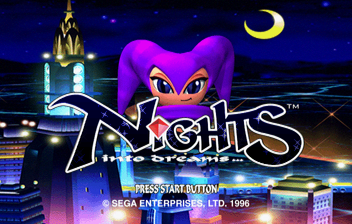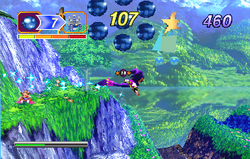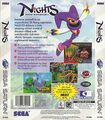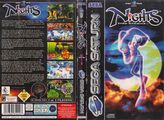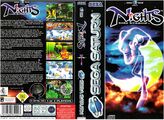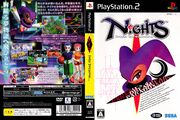NiGHTS into Dreams
From Sega Retro
| NiGHTS into Dreams | |||||||||||||||||||||||||||||||||||||||||||||||||||||||||||||||||
|---|---|---|---|---|---|---|---|---|---|---|---|---|---|---|---|---|---|---|---|---|---|---|---|---|---|---|---|---|---|---|---|---|---|---|---|---|---|---|---|---|---|---|---|---|---|---|---|---|---|---|---|---|---|---|---|---|---|---|---|---|---|---|---|---|---|
| System(s): Sega Saturn, PlayStation 2, PlayStation 3 (PSN), Xbox Live Arcade, Steam | |||||||||||||||||||||||||||||||||||||||||||||||||||||||||||||||||
| Publisher: Sega | |||||||||||||||||||||||||||||||||||||||||||||||||||||||||||||||||
| Developer: Sonic Team, Sega Studio China | |||||||||||||||||||||||||||||||||||||||||||||||||||||||||||||||||
| Sound driver: SCSP/CD-DA (19 tracks) | |||||||||||||||||||||||||||||||||||||||||||||||||||||||||||||||||
| Peripherals supported: 3D Control Pad | |||||||||||||||||||||||||||||||||||||||||||||||||||||||||||||||||
| Genre: Action | |||||||||||||||||||||||||||||||||||||||||||||||||||||||||||||||||
| Number of players: 1 | |||||||||||||||||||||||||||||||||||||||||||||||||||||||||||||||||
| |||||||||||||||||||||||||||||||||||||||||||||||||||||||||||||||||
|
CERO Missing Parameter! DJCTQ
Missing Parameter! |
NiGHTS into Dreams (ナイツ into dreams) is a video game developed by Sonic Team, and was originally released for the Sega Saturn in mid-1996. It was the first game to be produced by Sonic Team not feature Sonic the Hedgehog, and debuted with the 3D Control Pad, Sega's answer to the Nintendo 64's innovative controller.
NiGHTS is seen by many to be one of the strongest original titles for the system, with cutting edge visuals and surprisingly complex gameplay. In the western world, NiGHTS was used as a marketing ploy to allow the Saturn to compete against Super Mario 64 for the Nintendo 64, and other 3D titles for the Sony PlayStation in the 1996 winter holiday season. Today it is seen as a cult classic and one of the flagship products of Sega during the Saturn era.
Contents
Story
Players take the role of either Claris or Elliot, two children living in the city of Twin Seeds. In their dreams, they enter the world of Nightopia, where all human dreams are played out. An evil creature known as Wizeman is gathering power to take control of Nightopia. The children team up with NiGHTS, a rogue Nightmaren (nightmare-dweller) trying to stop Wizeman.
Gameplay
There are eight "dreams" (or levels) in NiGHTS, four for Claris, and four for Elliot, all split into two halves. The first half acts as a traditional level, while the second half (nightmare) acts as a boss. Both halves must be completed to access the next dream.
For the most part, NiGHTS into Dreams is a "2.5D" video game, where the world is rendered as 3D textured polygons, but gameplay is played on a two dimensional field. The basic goal of the game is to reclaim the four stolen "Ideyas" from the four Ideya Captures spread across the level, and return them to the Ideya Palace. Ideya Captures are destroyed by collecting with them, however 20 Blue Chips dotted across the level need to be collected first.
Players usually have to take control of the jester, NiGHTS to achieve this goal. NiGHTS traverses across the 2.5 plane through the skies, performing aerial acrobatics, defeating enemies and ranking up points. However at the start of the level, NiGHTS is held captive within the Ideya Palace, and players need to control the children, Claris or Elliot. The children are not restricted to the 2.5D plane, and can in fact traverse across the map as if the game were a 3D platformer, scaling mountains and wandering across valleys. The children are, however, restricted to the map's boundaries, and will be pursued by the infamous "Alarm Egg" - a floating egg with a clock face on one side. Getting caught by the Alarm Egg is the only way the game can end within a regular level - enemies will slow the children down, but not cause any damage.
Freeing NiGHTS is as simple as entering the palace (usually placed a short distance in front of the starting point), but is not strictly necessary to rescue Ideyas from Ideya Captures. In the 3D children mode, many of the items usually found in the skies lie on the ground (including Blue Chips), and Ideya Captures are within jumping distance. This style of gameplay was adapted for the Sonic into Dreams minigame of Christmas NiGHTS.
Like Sonic the Hedgehog the game is played almost entirely with one button (![]() ,
, ![]() or
or ![]() ) and the D-Pad (or analogue stick), allowing the children to jump or NiGHTS to speed up and spin. Spinning however, drains power from the meter in the bottom left of the HUD, and is replenished by flying through large yellow/orange rings. The
) and the D-Pad (or analogue stick), allowing the children to jump or NiGHTS to speed up and spin. Spinning however, drains power from the meter in the bottom left of the HUD, and is replenished by flying through large yellow/orange rings. The ![]() and
and ![]() buttons allow NiGHTS to perform acrobatics, though are only useful if the player flies through a "Power Loop". NiGHTS can defeat enemies by performing a "paraloop", otherwise known as moving in a clockwise or anticlockwise circle. This can also reveal bonuses and collect multiple items at once (including sometimes those in the background).
buttons allow NiGHTS to perform acrobatics, though are only useful if the player flies through a "Power Loop". NiGHTS can defeat enemies by performing a "paraloop", otherwise known as moving in a clockwise or anticlockwise circle. This can also reveal bonuses and collect multiple items at once (including sometimes those in the background).
Each of the four Ideyas is located on separate looped 2.5D "courses" (or "mares") for NiGHTS, each of which passes through the Ideya Palace. Players will travel around in circles until the Ideya Capture is destroyed, but items will re-spawn if the far away from the camera. NiGHTS' play is timed, and once the time runs out, you will lose any collected blue chips and become the children once more. The scoring system of NiGHTS is rather complex - scores are multiplied considerably by forming chains (links) of rings, and the value of items on the current course will increase further if the Ideya Capture is destroyed (the blue chips turning gold within this time).
To confound things further, NiGHTS has a surprisingly complex "A-Life" system, in which friendly Nightopians littered across the stage, can have their moods changed, be bred (not just with other Nightopians, but with enemies (Nightmaren), creating genetically modified "Mepians"), and be killed with very little effect on gameplay. If the player manages to not kill any Nightopians, an extra point award will be available on the fourth and final path for NiGHTS. The mood of the Nightopians can affect the level's music, though the change will only be heard if the player re-enters the stage.
Collecting all four Ideyas and taking them to the Ideya Palace will take NiGHTS to a boss, which needs to be destroyed within a certain timeframe. Here, it is impossible to play as the children, though getting hit will cause you to lose valuable seconds. Bosses vary depending on the stage, though usually involve bouncing off a weak spot or paralooping.
Nightmaren
Enemies, or "Nightmaren" serve little purpose in NiGHTS into Dreams other than to get in the way and slow your progress. Most can be knocked out of the way with a spin, and destroyed completely with a paraloop.
| 150px | Kircle |
|---|---|
| 150px | Hollow |
| 150px | Verol |
| 150px | Party |
| 150px | Crewle Pole |
| 150px | Mamu |
| 150px | Shleep |
| 150px | Cuttle |
| 150px | Gao |
| 150px | Snip |
Dreams
Claris

|
Spring Valley ~the IDEAL~ |
|---|---|
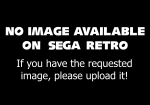
|
Mystic Forest ~the POSSIBILITY~ |

|
Soft Museum ~the CONFUSION~ |
Elliot

|
Splash Garden ~the AFFECTION~ |
|---|---|

|
Frozen Bell ~the CONSCIOUSNESS~ |

|
Stick Canyon ~the REVIVAL~ |
Both
History
Development
NiGHTS into Dreams represents both the end of an era at Sonic Team and the start of a new one, being the last Sega project to feature Yuji Naka as the lead programmer and the first to feature Takashi Iizuka as lead designer (replacing Hirokazu Yasuhara, now stationed in North America). The absense of Yasuhara means that the three original founding members of Sonic Team were reduced to two, and with both Naka and Naoto Ohshima rising up the ranks in the years which followed, NiGHTS marks the start of a new generation of Sonic Team developers.
Following the release of Sonic & Knuckles, the key players of Sonic Team spent six months brainstorming on new ideas, with work on NiGHTS beginning around April 1995[9]. Naka began learning about Saturn programming in the Summer of 1994[10].
NiGHTS is a radically different project to the Sonic the Hedgehog games which preceeded it, and was inspired by the works of Carl Jung, and primarily his anima and animus concepts. It is said that Takashi Iizuka invested a significant amount of time researching dreams and the theories that surround them, observing the works of Sigmund Freud and Friedrich Holtz[11], meaning NiGHTS' themes offer a much deeper meaning than at first glance.
Naka and his team chose against developing a Sonic sequel, wishing to take a long break to come up with a more "advanced" game as opposed to falling into the trap of continuous sequels[9]. From an early stage it was decided that the game would be based around replay value, where rather than simply progressing through levels and not looking back, there would be reasons to revist stages and imrpove your skills[9].
The visual style NiGHTS into Dreams borrowed from Cirque du Soleil, witnessed by Yuji Naka and others while playing at the Treasure Island Hotel and Casino in Las Vegas. It's oddly typed name was originally put in place to differentiate the NiGHTS character from the word "nights", with the lower-case "i" coming from the gem on the character's chest.
NiGHTS was originally set to be a much slower game, but the speed gradually increased over time to make the game more interesting[12]. Naka acknowledged that more could be done with the Saturn[12] (something perhaps proven with Burning Rangers), but likewise it was said that demonstrating graphical and technical prowess was not a priority for the team[13].
While Sonic was seen as a one-dimensional character, NiGHTS had emotions, and was designed to look like an angel to appeal more towards US and European cultures which had proven so successful for Sonic[12]. Notably (and ignored by its sequel), NiGHTS was designed neither to be male or female[14][13][15], but to represent "another you" in the dream world[14]. The character was envisoned as a "hero within your nightmares", having a slightly frightening look but also being cute[13]. NiGHTS is also the colour purple, attempting to challenge an idea that purple was unsuitable in the toy industry[15].
Prior to settling on the "dreams" idea, concepts at Sonic Team included "adventure" and "military" themes, among others[11]. The plan was to contradict the worlds of Sonic the Hedgehog[11].
During testing it was noted that the standard Saturn control pad was not as responsive as the team desired, so work began on a new control scheme in the summer of 1995[16]. Roughly 100 prototype controllers were built and tested[16][17], including remotes[17], foot controllers[17] and even the concept of using a NiGHTS-shaped doll to simulate movements[16]. The 3D Control Pad was developed simultaneously over the course of six months[16] to ensure the game was more smooth and comfortable to play[12].
According to Sonic Team, major parts of the code were re-written between five and ten times[16]. Very little is used from Sega AM2's Sega Graphics Library, with most of the technology being created by Sonic Team[10].
Voice samples were recorded in-house by various developers, usually in the middle of the night as Sonic Team's studios were not sound-proofed.
The game was first shown in Japan at the '96 Tokyo Toy Show[18]. The trailer from this event is available as an unlockable in Christmas NiGHTS.
As one of the top Sega employees in his field, Yuji Naka's engine for NiGHTS is often considered to be one of the most ambitious programming projects on the Saturn, at one point being recycled for Sonic X-treme (much to his distaste). Much of the game was built with unique input methods in mind (such as odd flight sticks), inevitably evolving into Saturn's the 3D Control Pad. At one point in development, the team was visited by Steven Spielberg, who played the game on an experimental controller, later dubbed internally as the "Spielberg Controller". Unique controllers would be explored again in the development of Air NiGHTS, a cancelled Sega Dreamcast sequel.
Sonic Team were for a long time interested in a PC version[16], and Naka has stated that he created a conversion of NiGHTS shortly after the Saturn game's release. In an interview he assumed it had been released, however PC users did not receive a port of the game until 2012, when a version was released for Steam.
Yuji Naka has stated that NiGHTS was not intended to receive a sequel, being a stand-alone game similar to Spielberg's E.T. the Extra-Terrestrial. After NiGHTS, Naka would assume management roles as producer and head of Sonic Team, before leaving to found Prope in 2006, only for NiGHTS: Journey of Dreams to be released one year later.
Legacy
Christmas NiGHTS
In December 1996, a special one-level Christmas version, Christmas NiGHTS was developed, being released as a stand-alone product in Japan. Elsewhere it was bundled as a free promotional item.
Cameos
NiGHTS went through a long period of being referenced to in Sonic Team games, but not given an official sequel. There are cameos in all Sonic Team games in the Sega Dreamcast era, and a bonus NiGHTS game was included in the Nintendo GameCube version of Phantasy Star Online and Billy Hatcher and the Giant Egg that can be downloaded to the Game Boy Advance. There is also a NiGHTS-themed pinball level in Sonic Pinball Party.
Sequel
NiGHTS saw a fully fledged sequel in 2007 with the release of NiGHTS: Journey of Dreams, though remains controversial among fans for its changes in design and presentation. Since then, NiGHTS has gone on to assume roles in other games, such as Sega Superstars, Sega Superstars Tennis, Sonic & Sega All-Stars Racing and Sonic & All-Stars Racing Transformed.
Sega AGES Re-Release
In 2008 the game was re-released as a budget game for the PlayStation 2 in Japan. This conversion was handled by Sega Studios China, and features enhanced graphics (and 16:9 widescreen support), content from Christmas NiGHTS and a number of minor tweaks to gameplay. It also features image galleries, a movie viewer mode and different seasonal outfits.
Sega Heritage Digital Re-Release
The PlayStation 2 version was not released outside of Japan, but was used as a base for a set of "HD" conversions for the Xbox Live Arcade, PlayStation Network and Steam services. These versions are almost identical to the 2008 PlayStation 2 adaptation, though lack some content (most notably the Sonic into Dreams minigame from Christmas NiGHTS) and reportedly lack true 360-degree analogue controls. The game is rendered at widescreen 720p, though the textures, models and technical features such as draw distance remain similar to their PlayStation 2 counterparts.
Production credits
Saturn version
- Executive Producer: Hayao Nakayama
- Product Manager: Youji Ishii
- Producer: Yuji Naka
- Director: Naoto Ohshima
- Lead Game Designer: Takashi Iizuka
- Senior Game Designers: Takeshi Niimura, Yuji Saito
- Lead Programmer: Yuji Naka
- Senior Programmers: Takahiro Hamano, Takuya Matsumoto
- A-Life Programmer: Tetsu Katano
- Programmers: Akio Setsumasa, Yasuhiro Takahashi, Yasuhiro Watanabe, Atsutomo Nakagawa
- NiGHTS Designer: Naoto Ohshima
- Character Designer: Kazuyuki Hoshino
- World Artists: Takumi Miyake, Shigeru Okada, You Nishiyama, Shinichi Higashi, Ryo Kudo
- A-Life Character Designers: Toshiko Okano, Hideaki Moriya, Tohru Watanuki
- Artists: Tomonori Dobashi, Namie Manabe, Hiroki Okabata
- CG Movie Director: Norihiro Nishiyama
- CG Movie Artists: Norihiro Nishiyama, Masahiro Kumono, Hiroshi Nakatani, Motomu Hayashi, Mika Okada, Yumiko Miyabe, Miho Takayanagi, Saori Wada, Nobuhiko Honda
- Chief Sound Director: Yukifumi Makino
- Compose & Arrange: Naofumi Hataya, Tomoko Sasaki, Fumie Kumatani
- Lyrics: Tomoko Sasaki
- Translation: Wornell Jones
- Sound Effects: Tatsuya Kouzaki, Saori Kobayashi, Fumie Kumatani
- Sound Programmer: Atsumu Miyazawa
- Recording Director: Tatsutoshi Narita
- Recording Engineer: Naoyuki Machida
- Musicians
- :Vocal: Curtis, King, Jr., Dana Culitri, Cameron Earl Strother, Jasmine Ann Allen
- :Drums: Tadashi Matsumoto
- :Keyboard: Tadashi Ohtsubo
- :Bass: Kouhei Okamura
- :Guitar: Akira Sasaki, Tomoya Koga
- :Sax, Flute: Junichi Yoshida
- :Synthesizer Operation: Masafumi Nakao
- Arrangers: Hayato Matsuo (Orchestra Arrange), Akira Sasaki ("Dreams Dreams")
- Executive Management: Shoichiro Irimajiri, Tom Kalinske, Shinobu Toyoda, Malcolm Miller
- Executive Coordination: Daizaburo Sakurai, Makoto Oshitani, Jin Shimazaki, Kouichi Nagata, Noriyoshi Ohba, Kou Tanaka
- Promotion Management: Ren Mori, Hideki Okamura, Hirokazu Kanno, Takayuki Kawagoe
- Public relations: Hiroto Kikuchi, Tadashi Takezaki, Masatoshi Kawaguchi, Yasushi Nagumo
- Visual Material Editors: Ikuo Ishizaka, Hidehiro Kumagai, Masato Yoshioka
- Peripheral Support: Osamu Kaji, Kenji Tosaki, Atsunori Himoto, Akitoshi Oikawa, Hiroshi Kitagawa, Toshinori Date
- Market Research: Seigo Tabira, Tsuyoshi Sawada, Miho Okamura
- Manual: Hiroyuki Mitsui, Youichi Takahashi, Toshiki Yamaguchi, Chieko Nakamura
- Internet Support: Mutsuhiro Fujii
- Overseas Coordination: Ryoichi Hasegawa
- Special Thanks: Masanobu Tsukamoto, Akira Nishikawa, Akira Funada, Chika Ikegame, Miki Morimoto, Yosuke Okunari, Manabu Kusunoki, Yoshiaki Kashima, Yayoi Wachi, Kentaro Koyama, Sanae Tatsuo, Tohru Mita, Shigenori Araki, Yoshio Inoue, Yuji Sawairi, Haruki Nakayama, Emi Sasaki, Nobuhiko Shimizu
Cybersound™
Produced by: Sega
PlayStation 2, PSN, XBLA and PC versions
- Original version Created By: Sonic Team
- Creative Producer: Yosuke Okunari
- Producers: Makoto Uchida, Jian Chen
- Directors: Akira Ogata, Kazuya Takahashi, ShuQiao Li
- Lead Programmers: Akira Ogata, Ming Lu
- Programmers: Chao Lian, Jie Geng, Jun Sun, YuZhong Zhou, Ying Feng, ShengHui Su, Yang Feng, Min Zheng, MinJun Xu
- Lead Artists: SiMin Yang, HaoChong Shi
- Artists: YongQing Yu, Jun Zhang, JiaNi Liang, HuaJun Liu, ZhiXin Ye, WenJie Wu, Jie Fang, ZhiJin Wu, ZhiCheng Deng, Shuo Li, Wei Chen
- Sound: YiNing Xu
- Lead Tester: Taishan Gu
- Support: Ling Chen
- Technical Advisers: Tomoaki Takayanagi, Katsunori Kosuge
- Technical Support: Takashi Shoji, Akihiro Etori, Atsushi Hirano
- Supervisors: Takashi Iizuka, Kazuyuki Hoshino, Naofumi Hataya, Tetsu Katano
- Marketing Support: Toshiro Nakayama
- Promotion: Mitsuru Takahashi, Daisuke Sekine, Takayoshi Ouchi, Nobuaki Okamoto, Akiko Matsuo, Sachi Matsushima, Ikuo Ishizaka
- Publicity: Yasushi Nagumo, Mamoru Kodama, Kenichi Hashimoto, Kensuke Nakamura, Katsumi Baba, Hiromi Seida, Reiko Chiba, Masaya Santo
- Web Design: Mutsuhiro Fujii, Akiko Horie
- Sales: Akira Nomoto, Toru Yasuda, Tomoaki Ishidao, Takeshi Shimizu, Naoko Ooka, Yoshihito Endo, Teruyuki Awaji, Yasunobu Masahiro, Katsushi Yasuda, Toshiyuki Tanaka, Nobuhiro Tanaka, Haruo Imatsu, Katsutoshi Memezawa, Yoshiaki Yamazaki, Akihide Ichimura, Tomohiko Hayashi, Tetsuo Sasaki, Hiroshi Iizuka, Hiroki Ohta, Koichi Iino, Shinya Oosaki, Seiji Aoyagi, Yoshihiro Enomoto, Teruyuki Kaida, Mitsuaki Sugibayashi, Takayuki Murata
- Production Control: Tomoki Kaji, Hitoshi Todo
- Software Package & Software Manual Production: Yoshihiro Sakuta, Hiroki Osawa, Sonoko Kai
- Software Test: Junichi Shimizu, Akira Nishikawa, Akira Terasawa, Sunao Murayama, Yuki Takahashi, Takashi Shimogaito
- Special Thanks: Yuji Naka, Masahiro Kumono, Hideaki Moriya, Takao Miyoshi, Tomohide Shoji, Akiko Kuroda, Ryoichi Hasegawa, Seiji Hayashi, Seijiro Sannabe, Kagasei Shimomura
- Lead Producer: Hiroyuki Miyazaki
- Executive Producers: Hajime Satomi, Hisao Oguchi
© SEGA Presented by: Sega
Track list
| 1. [data track 1] |
|---|
| 2. [data track 2] |
|---|
| 3. <JINGLE> Acrobat Time (00:12) |
|---|
| Composed by: Naofumi Hataya |
| 4. <JINGLE> Time Up (00:12) |
|---|
| Composed by: Naofumi Hataya |
| 5. Woosh (00:11) |
|---|
| 6. <JINGLE> Pia Over (00:13) |
|---|
| Composed by: Fumie Kumatani |
| 7. <JINGLE> Mare Over (00:16) |
|---|
| Composed by: Fumie Kumatani |
| 8. The Dragon Gave A Loud Scream (02:08) |
|---|
| Composed by: Naofumi Hataya |
| 9. She had Long Ears (02:08) |
|---|
| Composed by: Tomoko Sasaki |
| 10. E-LE-KI Sparkle (02:08) |
|---|
| Composed by: Tomoko Sasaki |
| 11. NiGHTS and Reala (02:08) |
|---|
| Composed by: Naofumi Hataya |
| 12. NiGHTS and Reala : Theme of A Tragedic Revenge (02:08) |
|---|
| Composed by: Naofumi Hataya |
| 13. The Mantle (02:08) |
|---|
| Composed by: Tomoko Sasaki |
| 14. Deep it Lies (02:02) |
|---|
| Composed by: Fumie Kumatani |
| 15. D'Force Master (Intro) (00:34) |
|---|
| Composed by: Tomoko Sasaki |
| 16. D'Force Master (02:03) |
|---|
| Composed by: Tomoko Sasaki |
| 17. Gate of Your Dream (01:28) |
|---|
| Composed by: Tomoko Sasaki |
| 18. After The Dream (01:29) |
|---|
| Composed by: Naofumi Hataya |
| 19. Message From Nightopia (01:29) |
|---|
| Composed by: Tomoko Sasaki |
| 20. Dreams Dreams : In Silent Memory (01:29) |
|---|
| Composed by: Tomoko Sasaki |
| 21. Dreams Dreams : Kids Ver. (05:39) |
|---|
| Vocals: Jasmine Ann Allen & Cameron Strother |
Magazine articles
- Main article: NiGHTS into Dreams/Magazine articles.
Promotional material
- NiGHTS US StoreDisplay.jpg
Saturn US store display
Saturn JP TV advert
- 1996 09 - Nights Into Dreams.jpg
Saturn ES print advert
also published in:
- Electronic Gaming Monthly (US) #87: "October 1996" (1996-xx-xx)[19]
- Game Informer (US) #41: "September 1996" (1996-0x-xx)[20]
also published in:
- Electronic Gaming Monthly (US) #87: "October 1996" (1996-xx-xx)[19]
Artwork
- Nights Logo.jpg
Physical scans
Saturn version
| 91 | |
|---|---|
| Based on 41 reviews | |
| Saturn, JP (3D Control Pad) |
|---|
Error creating thumbnail: convert: Insufficient memory (case 4) `/home/sonicret/domains/segaretro.org/public_html/images/f/f9/NiGHTS_Into_Dreams_Sega_Saturn_JP_Control_Box_Back.jpg' @ error/jpeg.c/JPEGErrorHandler/338. Error code: 1 Error creating thumbnail: convert: Insufficient memory (case 4) `/home/sonicret/domains/segaretro.org/public_html/images/f/fe/NiGHTS_Into_Dreams_Sega_Saturn_JP_Control_Box_Front.jpg' @ error/jpeg.c/JPEGErrorHandler/338. Error code: 1 Cover
|
| Saturn, JP (Satakore) |
|---|
| Saturn, BR |
|---|
| <div style="margin:auto; max-width:Expression error: Unexpected < operator.px">
320x120px Cover
|
| Saturn, AU |
|---|
|
PlayStation 2 version
Technical information
Save data
The Sega Saturn version game makes use of the Saturn's internal battery back-up as well as the Saturn Backup Memory to save progress. In addition, it saves data for the A-Life system separately due to its large file size.
| Name | Comment | File Size |
|---|---|---|
| NIGHTS___## | Score data | 30 |
| NIGHTS___## | A-life | 197 |
External links
- Sega of Japan catalogue pages (Japanese): PlayStation 2
- Official website for PSN and XBLA versions (Japanese)
- NiGHTS into Dreams on Xbox Marketplace: UK, US, JP
- NiGHTS into Dreams on Steam
References
- ↑ File:CVG UK 179.pdf, page 53
- ↑ File:CVG UK 193.pdf, page 57
- ↑ File:CVG UK 179.pdf, page 9
- ↑ Press release: 1996-08-12: $10 million "NiGHTS" launch is largest ever for Sega Saturn
- ↑ 5.0 5.1 http://www.tectoy.com.br/releases/index.htm (Wayback Machine: 1998-06-25 19:48)
- ↑ http://www.jp.playstation.com/software/title/slpm66926.html
- ↑ http://www.jp.playstation.com/software/title/hsn0013.html
- ↑ http://www.jp.playstation.com/software/title/jp0177npjb00226_00nightsintodreams.html
- ↑ 9.0 9.1 9.2 File:Edge UK 035.pdf, page 38
- ↑ 10.0 10.1 File:NextGeneration US 19.pdf, page 47
- ↑ 11.0 11.1 11.2 File:CVG UK 176.pdf, page 24
- ↑ 12.0 12.1 12.2 12.3 File:Edge UK 035.pdf, page 39
- ↑ 13.0 13.1 13.2 File:SSM UK 11.pdf, page 40
- ↑ 14.0 14.1 File:SSM UK 11.pdf, page 38
- ↑ 15.0 15.1 File:CVG UK 176.pdf, page 23
- ↑ 16.0 16.1 16.2 16.3 16.4 16.5 File:SSM UK 11.pdf, page 41
- ↑ 17.0 17.1 17.2 File:CVG UK 176.pdf, page 25
- ↑ File:SSM UK 15.pdf, page 56
- ↑ 19.0 19.1 Electronic Gaming Monthly, "October 1996" (US; 1996-xx-xx), page 11
- ↑ Game Informer, "September 1996" (US; 1996-0x-xx), page 68
- ↑ 21.0 21.1 File:CVG UK 178.pdf, page 54 Cite error: Invalid
<ref>tag; name ":File:CVG UK 178.pdf_p54" defined multiple times with different content - ↑ File:GameInformer US 041.pdf, page 40
- ↑ 23.0 23.1 File:GMR US 09.pdf, page 91 Cite error: Invalid
<ref>tag; name ":File:GMR US 09.pdf_p91" defined multiple times with different content - ↑ 24.0 24.1 File:MeanMachinesSega47UK.pdf, page 56 Cite error: Invalid
<ref>tag; name ":File:MeanMachinesSega47UK.pdf_p56" defined multiple times with different content - ↑ File:SSM_UK_10.pdf, page 72
- ↑ File:SSM_JP_19960712_1996-11.pdf, page 231
- ↑ 27.0 27.1 Saturn no Game wa Sekai Ichi~i~i~i!: Satamaga Dokusha Race Zen Kiroku, SoftBank Publishing, page 11 Cite error: Invalid
<ref>tag; name ":File:SnGwSISDRZK Book JP.pdf_p11" defined multiple times with different content - ↑ 576 KByte, "Október 1996" (HU; 1996-xx-xx), page 36
- ↑ Digitiser (UK) (1996-09-05)
- ↑ Edge, "September 1996" (UK; 1996-08-02), page 70
- ↑ Electronic Gaming Monthly, "September 1996" (US; 1996-xx-xx), page 25
- ↑ Famitsu, "1996-07-12" (JP; 1996-06-28), page 1
- ↑ Freak, "8/96" (IL; 1996-xx-xx), page 1
- ↑ Fun Generation, "09/96" (DE; 1996-08-14), page 72
- ↑ Gambler, "12/1996" (PL; 1996-xx-xx), page 1
- ↑ GameFan, "Volume 4, Issue 9: September 1996" (US; 1996-xx-xx), page 24
- ↑ GamePro, "October 1996" (US; 1996-xx-xx), page 88
- ↑ GamesMaster, "September 1996" (UK; 1996-08-01), page 40
- ↑ Game Informer, "September 1996" (US; 1996-0x-xx), page 42
- ↑ Intelligent Gamer, "September 1996" (US; 1996-0x-xx), page 58
- ↑ Joypad, "Septembre 1996" (FR; 1996-0x-xx), page 82
- ↑ LeveL, "Listopad 1996" (CZ; 1996-11-01), page 81
- ↑ MAN!AC, "09/96" (DE; 1996-08-14), page 44
- ↑ MAN!AC, "10/96" (DE; 1996-09-11), page 71
- ↑ Mega Fun, "09/96" (DE; 1996-08-21), page 66
- ↑ Next Generation, "October 1996" (US; 1996-09-17), page 174
- ↑ neXt Level, "September 1996" (DE; 1996-08-14), page 64
- ↑ Player One, "Septembre 1996" (FR; 1996-08-29), page 74
- ↑ Power Up!, "Saturday, September 21, 1996" (UK; 1996-09-21), page 1
- ↑ Saturn Fan, "1996 No. 15" (JP; 1996-07-05), page 164
- ↑ Saturn Fan, "1996 No. 18" (JP; 1996-08-23), page 72
- ↑ Saturn+, "Issue 4" (UK; 1996-10-24), page 28
- ↑ Score, "Prosinec 1996" (CZ; 1996-12-01), page 110
- ↑ Secret Service, "Grudzień 1996" (PL; 1996-12-01), page 59
- ↑ Sega News, "Listopad 1996" (CZ; 1996-1x-xx), page 12
- ↑ Sega Power, "September 1996" (UK; 1996-08-01), page 42
- ↑ Świat Gier Komputerowych, "12/1996" (PL; 1996-xx-xx), page 1
- ↑ Sega Saturn Magazine, "August 1996" (UK; 1996-07-20), page 72
- ↑ Sega Saturn Magazine, "1996-11 (1996-07-12)" (JP; 1996-06-28), page 231
- ↑ Strana Igr, "Oktyabr 1996" (RU; 1996-xx-xx), page 69
- ↑ Total Saturn, "Volume One Issue One" (UK; 1996-08-xx), page 34
- ↑ Total Saturn, "Volume One Issue Four" (UK; 1996-12-29), page 40
- ↑ Ultra Game Players, "October 1996" (US; 1996-09-03), page 95
- ↑ Video Games, "8/96" (DE; 1996-07-31), page 106
| Games in the NiGHTS into Dreams Series | |
|---|---|
| NiGHTS into Dreams (1996) | Christmas NiGHTS into Dreams (1996) | |
| NiGHTS into Dreams (1997) | |
| Air NiGHTS (Canceled) | |
| NiGHTS (2001) | |
| NiGHTS: Journey of Dreams (2007) | |
| NiGHTS into Dreams (2008) | |
| NiGHTS into Dreams (2012) | |
| NiGHTS Dream Wheel (2021) | |
| Sampler Discs | |
| NiGHTS into Dreams Sampler (1996) | |
| NiGHTS into Dreams related media | |
| NiGHTS Theme Song: Dreams Dreams (1996) | NiGHTS Original Soundtrack (1996) | A NiGHTS Remix: Another Dreams (1997) | NiGHTS: Journey of Dreams Game Soundtrack (2008) | NiGHTS: Hoshi Furu Yoru no Monogatari Original Soundtrack (2008) | NiGHTS into Dreams: Perfect Album (2008) | NiGHTS into Dreams (2024) | |
| NiGHTS Nice Night Tours (1996) | NiGHTS Kouryaku Guide (1996) | NiGHTS Hisshou Kouryaku Hou (1996) | NiGHTS Koushiki Guide Book (1996) | Prima's Secrets of the Games: NiGHTS into Dreams: The Official Strategy Guide (1996) | Sega Saturn "NiGHTS" Original Soundtrack (1996) | NiGHTS into Dreams (?) | NiGHTS: Journey of Dreams Official Strategy Guide (2007) | NiGHTS: Hoshi Furu Yoru no Monogatari Dream Flight Guide (2007) | |
| NiGHTS: Tsubasa ga Nakutemo Sora wa Toberu (1996) | |
| Sega Official Video Library Vol. 6: NiGHTS into Dreams (1996) | NiGHTS: Journey of Dreams: Behind the Scenes DVD (2007) | |
- Pages with broken file links
- Pages with reference errors
- 3D Control Pad-compatible games
- 1 player games
- JP Saturn games
- All JP games
- US Saturn games
- All US games
- EU Saturn games
- All EU games
- AU Saturn games
- All AU games
- BR Saturn games
- All BR games
- KR Saturn games
- All KR games
- Saturn games
- 1996 Saturn games
- All 1996 games
- Saturn action games
- All action games
- JP PlayStation 2 games
- PlayStation 2 games
- All 2008 games
- 2008 PlayStation 2 games
- PlayStation 3 games
- Unknown year games
- Xbox 360 games
- Old content rating field
- Use romtable template
- All games
- Credits without source
- Credits without reference
- Creditstable with no console field
- Track missing credits
- Track credits
- GalleryPrintAd file defined
- Old-style rating (comingsoon)
- External rating reference
- Old-style rating (cvg)
- Use magref
- Old-style rating (edge)
- Rating without PDF source
- Old-style rating (ew)
- Old-style rating (famitsu)
- Old-style rating (fungeneration)
- Rating without source
- Old-style rating (gamefan)
- Old-style rating (gamepro)
- Old-style rating (gamesmaster)
- Old-style rating (gi)
- Old-style rating (gmr)
- Old-style rating (mms)
- Old-style rating (nextlevel)
- Old-style rating (playerone)
- Old-style rating (segapower)
- Old-style rating (ssm)
- Old-style rating (ssmjp)
- Old-style rating (ssmjp r)
- Old-style rating (videogames)
- Update ratings template
- 21 old ratings
- NiGHTS
- Saturn games with bonus PC content
